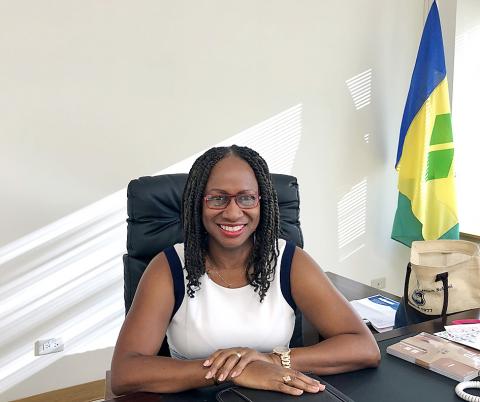St Vincent and the Grenadines will have the ability to advocate more strongly for Taiwan to be recognized when it takes its seat on the UN Security Council early next year, St Vincent and the Grenadines Ambassador to Taiwan Andrea Bowman said last week in an interview with the Central News Agency.
The Caribbean nation was elected in June to be a seat on the 15-member council for a two-year term and is to take its seat in January.
The council seat will put St Vincent and the Grenadines “in a position where our voice will be better heard,” and allow the country to advocate for “Taiwan’s right to be legitimately recognized,” she said.

Photo: CNA
“The voice of this little country in such a big seat … would be heard and would count for something,” Bowman said.
Her nation has been using its voice to speak up internationally for Taiwan and will continue to do so, she said.
“Only now it’s going to be a louder voice, a voice that carries even more weight,” said Bowman, who became St Vincent and the Grenadines’ first ambassador to Taipei in August.
On the issue of China’s efforts to take Taiwan’s diplomatic allies, Bowman said she recognized that “all allies of Taiwan would be targeted by China.”
However, her nation’s 38-year relationship with Taiwan was built on “trust and friendship,” she said.
Diplomatic ties with Taiwan are strongly supported by the public and by Vincentian Prime Minister Ralph Gonsalves and his Unity Labour Party, now in their fourth consecutive term, she said.
The decision to open an embassy was a strong indication of its commitment to bilateral diplomatic ties, Bowman said.
The embassy was formally opened in an Aug. 8 ceremony, but did not began service until Monday last week.
Bowman, a former high school principal, said her first priority as ambassador is to take care of Vincentian students in Taiwan and to decide how best the embassy can serve them.
“I want them to regard the St Vincent embassy as a home away from home,” Bowman said.
Her second priority is to establish a viable presence in Taiwan, promoting her nation through the media, exhibitions and cultural events, she said.
The embassy’s first major undertaking will be a series of activities in the week leading up to Oct. 27, the 40th anniversary of St Vincent and Grenadines independence, Bowman said.
The celebrations will include a reception at the embassy and public events in Taipei, all of which will help establish the nation’s presence in Taiwan, she said.
“We are in our early days, but bit by bit we will do more and more,” she said.

Taiwanese can file complaints with the Tourism Administration to report travel agencies if their activities caused termination of a person’s citizenship, Mainland Affairs Council Minister Chiu Chui-cheng (邱垂正) said yesterday, after a podcaster highlighted a case in which a person’s citizenship was canceled for receiving a single-use Chinese passport to enter Russia. The council is aware of incidents in which people who signed up through Chinese travel agencies for tours of Russia were told they could obtain Russian visas and fast-track border clearance, Chiu told reporters on the sidelines of an event in Taipei. However, the travel agencies actually applied

New measures aimed at making Taiwan more attractive to foreign professionals came into effect this month, the National Development Council said yesterday. Among the changes, international students at Taiwanese universities would be able to work in Taiwan without a work permit in the two years after they graduate, explainer materials provided by the council said. In addition, foreign nationals who graduated from one of the world’s top 200 universities within the past five years can also apply for a two-year open work permit. Previously, those graduates would have needed to apply for a work permit using point-based criteria or have a Taiwanese company

The Shilin District Prosecutors’ Office yesterday indicted two Taiwanese and issued a wanted notice for Pete Liu (劉作虎), founder of Shenzhen-based smartphone manufacturer OnePlus Technology Co (萬普拉斯科技), for allegedly contravening the Act Governing Relations Between the People of the Taiwan Area and the Mainland Area (臺灣地區與大陸地區人民關係條例) by poaching 70 engineers in Taiwan. Liu allegedly traveled to Taiwan at the end of 2014 and met with a Taiwanese man surnamed Lin (林) to discuss establishing a mobile software research and development (R&D) team in Taiwan, prosecutors said. Without approval from the government, Lin, following Liu’s instructions, recruited more than 70 software

Taiwanese singer Jay Chou (周杰倫) plans to take to the courts of the Australian Open for the first time as a competitor in the high-stakes 1 Point Slam. The Australian Open yesterday afternoon announced the news on its official Instagram account, welcoming Chou — who celebrates his 47th birthday on Sunday — to the star-studded lineup of the tournament’s signature warm-up event. “From being the King of Mandarin Pop filling stadiums with his music to being Kato from The Green Hornet and now shifting focus to being a dedicated tennis player — welcome @jaychou to the 1 Point Slam and #AusOpen,” the